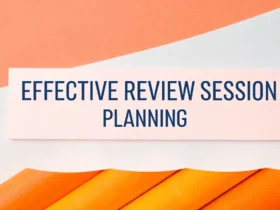The path to learning is now on your terms. Once confined to classrooms, education has broken free, offering boundless opportunities via online study. But with such freedom comes the need for structure. Are you ready to navigate this digital landscape and thrive?
Online learning offers flexibility. You can learn at your own pace and study in your own space. Yet, this convenience can also bring challenges. Procrastination, distractions, and a sense of isolation can derail your online study. Don’t let these hurdles stop you. This guide provides practical strategies to conquer these challenges and achieve academic success in the online world.
Creating a Conducive Online Study Environment
Your physical surroundings have a big impact on your ability to learn. Set up a study space that helps you focus.
Designating a Dedicated Study Space
Avoid studying where you relax. Your bed or couch might seem comfy, but they can make you sleepy. Choose a quiet area in your home, free from interruptions. It could be a spare room, a corner of your bedroom, or even a spot in your local library. Make it your study zone and nothing else. This helps your brain connect that space with learning.
Optimizing Your Study Area for Focus
Once you have your space, make it work for you. Good lighting is key. Natural light is best, but a desk lamp works too. Ensure your chair supports good posture. This will stop aches and pains during long online study sessions. Keep your space tidy. A cluttered desk can lead to a cluttered mind. Have all your materials close by. This avoids disruptions to get what you need.
Minimizing Distractions
Distractions are a major enemy of online study. Silence your phone or put it in another room. Let your family know when you need quiet time. Use website blockers to stop yourself from visiting social media or other distracting sites. Noise-canceling headphones can help block out background noise.
Time Management and Organization Strategies for Online Study
Time is a valuable resource, especially when studying online. Effective time management is key to making the most of your online study efforts.
Setting Realistic Goals and Creating a Study Schedule
Start by defining your learning goals. What do you want to achieve each week or month? Break down larger assignments into smaller, more manageable tasks. Create a study schedule that fits your lifestyle. Be realistic about how much time you can dedicate to studying each day. Use a planner or digital calendar to keep track of your commitments.
Prioritizing Tasks and Avoiding Procrastination
Not all tasks are created equal. Learn to prioritize. Use methods like the Eisenhower Matrix (urgent/important) to decide what to tackle first. If you struggle with procrastination, try the Pomodoro Technique. Work in focused bursts of 25 minutes, followed by short breaks. This can make daunting tasks feel less overwhelming.
Utilizing Time Management Tools and Techniques
Many digital tools can help you manage your time. Apps like Trello or Asana can help you organize tasks and track your progress. Forest is an app that encourages focused work by planting a virtual tree that dies if you leave the app. Experiment with different tools to find what works best for you.
Effective Online Study Techniques
It’s not just about the amount of time you spend studying, but how you study. Implement effective learning techniques to make the most of your online study sessions.
Active Learning Techniques
Passive learning, like simply reading or watching lectures, isn’t enough. Engage actively with the material. Take notes in your own words. Ask yourself questions as you read. Try teaching the material to someone else. This forces you to understand it deeply.
Utilizing Multimedia Resources Effectively
Online study often involves a variety of multimedia resources: videos, podcasts, interactive simulations. Don’t just passively consume them. Pause videos to take notes. Listen to podcasts while you exercise. Interact with simulations and try different scenarios.
Participating in Online Discussions and Forums
Online study doesn’t have to be a solo activity. Engage with your classmates and instructors in online discussions and forums. Ask questions, share your insights, and learn from others. This can deepen your understanding and create a sense of community.
Maintaining Motivation and Focus
Motivation can wane over time, especially with the flexibility of online study. Here’s how to keep yourself engaged and on track.
Setting Rewards and Celebrating Milestones
A little reward can go a long way. Set small rewards for achieving study goals. It could be something as simple as watching an episode of your favorite show or treating yourself to a coffee. Celebrate larger milestones, like finishing a course or acing an exam.
Finding an Online Study Buddy or Joining a Study Group
Having someone to share the online study journey with can be very helpful. Find a study buddy or join a study group. You can motivate each other, share notes, and discuss challenging concepts.
Practicing Self-Care and Avoiding Burnout
Online study can be demanding. Don’t neglect your well-being. Make time for activities you enjoy. Exercise regularly, eat healthy, and get enough sleep. If you feel overwhelmed, take a break. Step away from your computer and do something relaxing.
Overcoming Common Challenges in Online Study
Online study isn’t without its challenges. Addressing these common issues can pave the way for a smoother learning experience.
Dealing with Technical Issues
Technical glitches can be frustrating. Ensure you have a reliable internet connection. Familiarize yourself with the learning platform’s technical requirements. Have a backup plan in case of technical difficulties. Save your work frequently.
Managing Distractions and Maintaining Focus at Home
We’ve talked about minimizing distractions, but let’s dig deeper. Communicate boundaries with housemates. Use website and app blockers. Consider using a white noise machine or earplugs to minimize auditory distractions. Take regular breaks to avoid mental fatigue.
Communicating Effectively with Instructors and Peers Online
Clear communication is essential. When emailing instructors, use a professional tone and be specific about your questions. Participate actively in online discussions. Be respectful of others’ opinions. Use online communication tools effectively.
Leveraging Technology and Online Resources
Technology is your ally in online study. Use it to your advantage.
Utilizing Learning Management Systems (LMS) Effectively
Familiarize yourself with the features of your LMS. Learn how to navigate the platform, access course materials, submit assignments, and communicate with instructors.
Exploring Online Libraries and Research Databases
Take advantage of online libraries and research databases. These resources can provide access to a wealth of information. Learn how to conduct effective searches and evaluate the credibility of sources.
Using Productivity and Collaboration Tools
Use tools like Google Docs, Microsoft Teams, or Slack to collaborate with peers on group projects. These tools can facilitate communication, file sharing, and real-time editing.
Assessing Progress and Adapting Your Study Strategies
Learning is a dynamic process. Regularly assess your progress and adjust your online study strategies as needed.
Tracking Your Performance and Identifying Areas for Improvement
Keep track of your grades, test scores, and feedback from instructors. Identify areas where you are struggling and focus your efforts on improving those areas.
Seeking Feedback from Instructors and Peers
Don’t be afraid to ask for help. Seek feedback from instructors and peers on your work. Use their feedback to refine your understanding and improve your performance.
Adapting Your Study Techniques to Suit Different Learning Styles
Everyone learns differently. Experiment with different online study techniques to find what works best for you. Some people learn best by reading, while others prefer visual or auditory methods. Tailor your strategies to your learning style.
What Now? Mastering the Online Study Game
You’ve got the strategies; now it’s time to put them into practice. Your success with online study hinges on your ability to create a positive and productive learning environment, manage your time effectively, stay motivated, and leverage the many resources available. Embrace the flexibility and convenience of online study, but remember that it requires discipline and proactive engagement. Are you ready to make your online learning experience a triumph?















Leave a Reply
View Comments